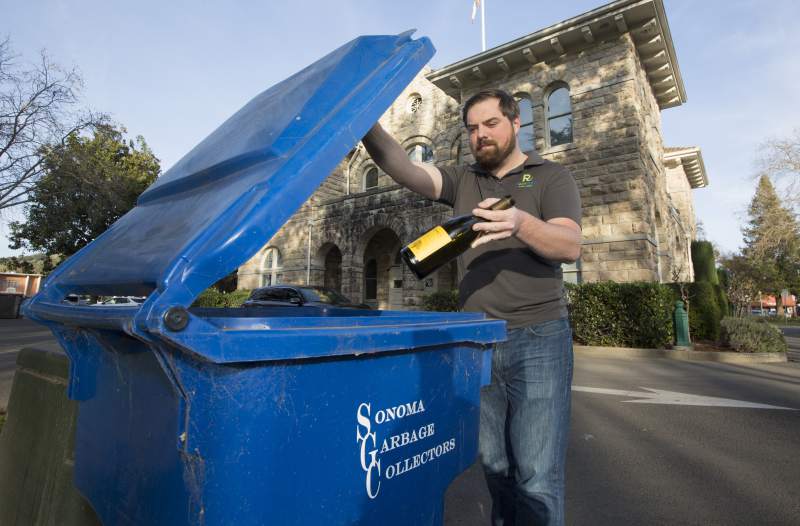Just when it feels like people are habitual recyclers and the blue bins fill up faster than the gray ones, a new bin comes along — and the rules change.
“It’s a process. We finally got people to the point where they don’t just drop (waste) where they are. Now they put it in a container, and that’s good,” said Ken Wells, who is a waste management expert and works with Sonoma Garbage Collection, the company which serves city residents.
But which container to put garbage in has gotten more confusing, said Wells, the former executive director of Sonoma County Waste Management Agency.
The United States used to ship tons of plastics to China for recycling, but that nation no longer wants America’s plastic waste — leaving municipalities scrambling to figure out how to manage garbage collection.
Sonoma County has three different collection companies, Wells said, and each has its own system and rules of what it will accept in the blue and green bins.
“One of the challenges is that there is no composting facility in Sonoma County,” said Travis Wagner, sustainability coordinator for the City of Sonoma. “It’s a problem because it’s all being shipped out of the county.”
Recycling plastics
Various types of plastics that were accepted in blue bins in the City of Sonoma are no longer accepted there, Wells said.
The rest of Sonoma Valley uses Recology waste management, which is able to accept a broader range of recyclables, said Sonoma Mayor Logan Harvey. Harvey’s day job is with Recology as a Waste Zero Specialist.
A couple years ago, grocery stores in the City of Sonoma stopped accepting plastic bottles such as those used for soda that could be returned to recoup the CRV (California Refund Value) charged when purchased. That left residents forced to either drive outside the city limits to find a place that would exchange them for the refund, or toss them into the recycle (or blue) bin.
But the problem, Wells said, is that even if those and other plastics are tossed into the blue bin, and the resident is thinking they are doing the right thing, some of those plastics will get pulled out at the sorting facility and tossed into the garbage pile destined for a landfill.
If the item isn’t clean, which to recyclers means it is contaminated and can’t be ground down for reuse, it goes to the landfill, he said.
And, China rejects dirty plastics, Harvey said.
Compostables
One of the more frustrating products for the experts is the so-called “compostable plastics.” They aren’t really recyclable in Sonoma County, Wells said.
“I think that is a greenwashing scam,” he said.
People think that if a container says it is made of “compostable” material it should go in the green bin with yard debris. Not so, Wells and Harvey said.
Compostable products take too long to break down, and facilities don’t have the time or space to handle those materials, Harvey said.
“It will probably go into the trash and this is unfortunate,” Wells said.
Just don’t buy plastics, they both said. Instead use items that can be cleaned and reused many times. If you are planning a picnic, opt for wood and paper-fiber materials, and stay away from cups or plates that have a coating because that prevents it from breaking down.


